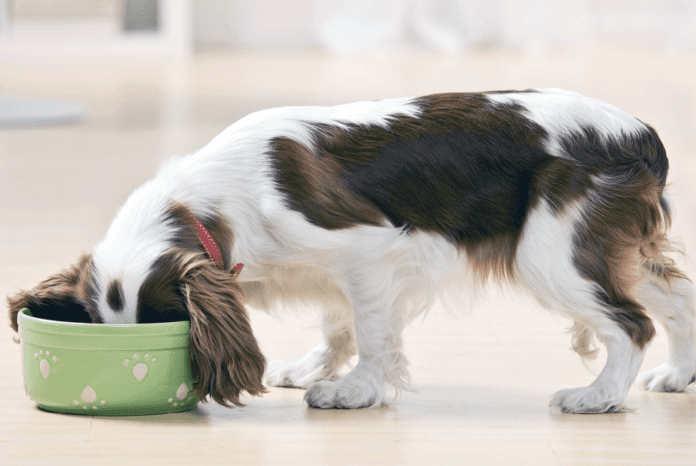Intriguing research on more than 10,000 dogs suggests that pets fed one meal a day instead of two or more meals experience cognitive decline at a significantly slower rate. The difference in cognition scores between dogs fed once a day and dogs fed more frequent daily meals was equivalent to the difference between a 7-year-old dog and an
11-year old.
That’s not all. When the same researchers looked at more than 24,000 dogs for a number of other health parameters, they found that those fed once a day were less likely than those given two or more meals to have gastrointestinal, dental/oral, orthopedic, kidney/urinary, and liver/pancreas health problems.
The research results don’t tell the whole story
The study, part of the Dog Aging Project, had a number of limitations, as the researchers themselves point out. One of the most important ones was that all of the information was reported by the dogs’ human families. These were not dogs randomly selected to receive either one or two meals a day when they were puppies and then followed over the course of many years. Things were left uncontrolled, and that can skew what happens over the course of time.
For instance, it’s possible that some dogs started to be fed more frequently on the advice of a veterinarian if they were diagnosed with conditions such as kidney disease or gastrointestinal disease. Because some dogs are fed smaller meals more often once they become ill, it can look like extra meals caused problems when in fact they were a response to problems.
Then, too, feeding a dog once a day may result in lower calorie intake overall, and it is known across mammalian species that remaining quite trim increases health and longevity. The researchers did not have information on the dogs’ daily calorie consumption. It may have been that the number of calories is what tipped the results rather than the number of meals offered.
Similarly, the researchers were not able to ascertain what the dogs received in terms of between-meal snacks. That could have totally thrown the results.
None of this is to say the study isn’t intriguing or that it’s “wrong,” simply that it doesn’t prove anything about cause and effect when it comes to a possible relationship between fewer meals and better health. The number of meals might be a marker for something else that affects a dog’s health. The researchers agree, viewing the results as a “first step of an on-going exploration.”
The right number of times to feed your dog every day
Some healthy adult dogs eat to live rather than live to eat and may be perfectly happy with once-a-day feeding. But two or more meals per day are absolutely fine as long as all of the dog’s meals combined don’t overshoot the mark for a calorie limit that will keep her lean and healthy. And for many dogs, multiple meals serve a number of purposes. Here are some of them.
Dogs like predictability. In fact, structure and routine might be particularly important for reducing anxiety in a nervous pet. Building multiple meals into a dog’s day at specific times can provide some of that structure. Additionally, some dogs have anxiety about getting enough food, perhaps because they were homeless for a while before coming to live with you. Meals help build their sense that they won’t go hungry, that all is right with the world.
Feeding your dog strengthens your bond with her. Food is a resource she cannot live without, and providing it more than once a day might serve as a reminder that you will always take care of her.
It’s possible some dogs will get very hungry waiting 24 hours for their next meal, even if the meal they just ate had the right number of calories for an entire day’s worth of food. Think of yourself when you overeat. It’s not like it automatically averages out. Yes, you might be able to comfortably wait longer till your next meal, but not until the next day. We can’t know for sure, but it’s conceivable that a dog might go through the same hunger pangs eating just one meal a day.






I prepare homemade foods for my 8-year-old female pittie service dog and serve small portions 2x a day. She weighs 45 lbs. I won’t let her get fat to extend her life, as I love her.
She’s happy and healthy with my regimen… Recently had her teeth cleaned.
Typical small meals:
– Chicken thigh meat or cut-up cube steak (no seasonings)
– Quinoa (plain) or brown, or Japanese rice (plain boiled)
– Tap or bottled water poured on the food (induces more water consumption throughout the day…)
– Mashed carrots or pumpkin
– Tablespoon of 1% fat plain yogurt (be careful to NOT feed vanilla or sweetened)
– Vitamin powder supplement 1x a day
– D-Mannose powder
– Dog Probiotic once or twice a day mixed into food
– Cranberry extract powder (the supplements help prevent UTI’s)
4-5 short walks a day.
Comments or suggestions are welcomed!